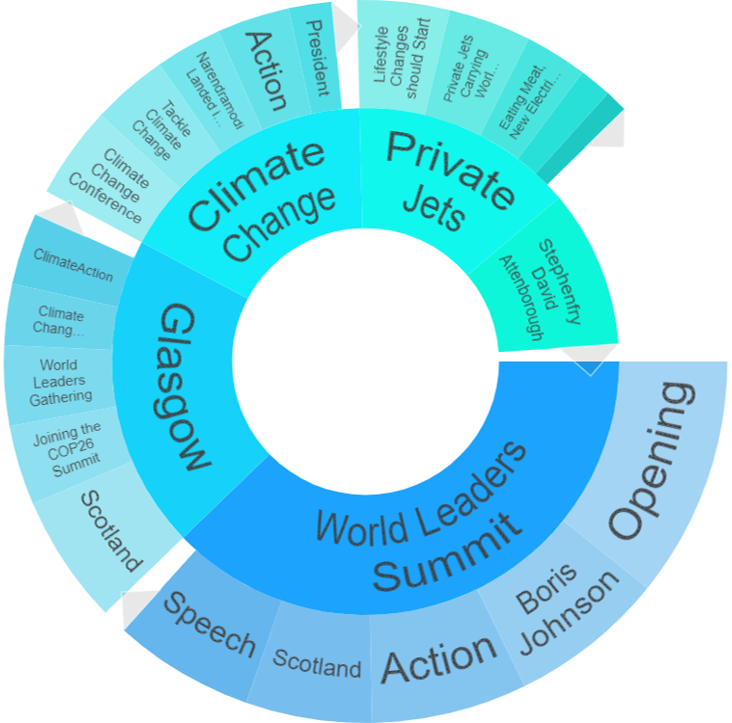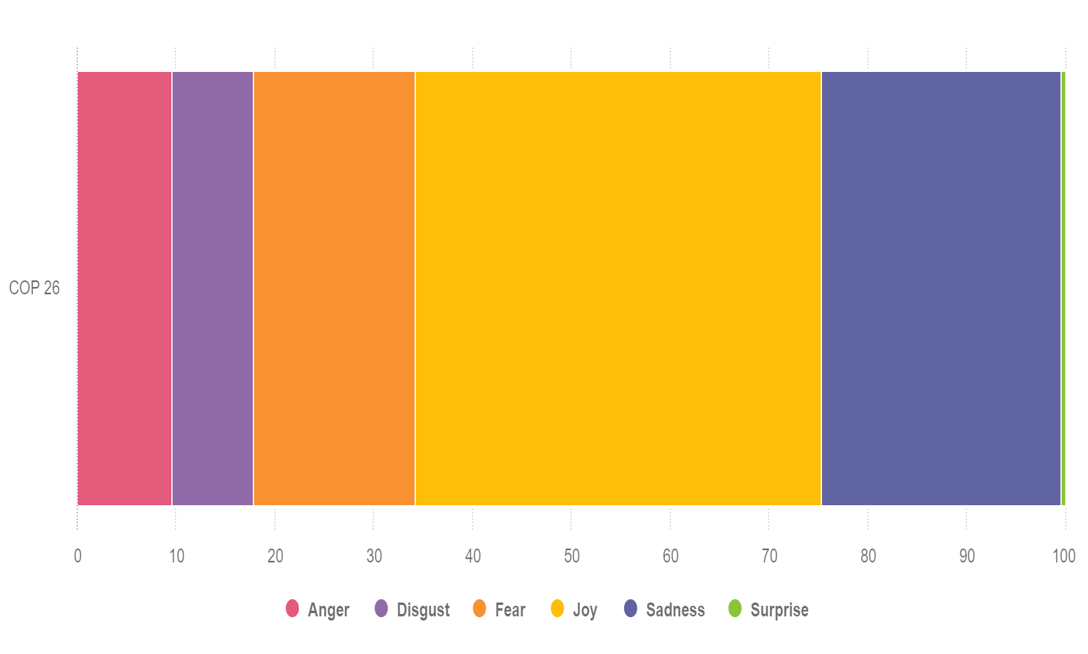ESG Newsletter: COP 26 Special Editions – 5th November 2021
Your update on COP26
Forests. Methane. Global finance. Carbon pricing. New national commitments to reduce greenhouse gas emissions. It’s been a busy first week at COP26 and this week’s ESG+ newsletter is packed to bursting with our recap and analysis of the most significant announcements, including our assessment of the stories gaining most traction on social media. We’ve got a lot to get through, so let’s jump straight in.
30 by 30 for methane emissions
In one of the first major announcements of the conference, more than 100 countries signed up to a pledge to cut methane emissions by 30% by 2030. August’s IPCC report highlighted how methane is a significant contributor to global warming, and how a failure to tackle methane emissions would make the Paris Agreement impossible to achieve. Although methane is a relatively short-lived greenhouse gas, over 20 years it has 80 times the global warming potential of carbon dioxide meaning action now can make a significant contribution towards slowing climate change by 2050. While the oil and gas sector can substantially cut their methane emissions by addressing leaks, agricultural emissions present a greater challenge. Support for the Global Methane Pledge is growing, however significant emitters such as Russia, China and India are not on board. While all commitments are voluntary, there are early signs of progress with the US Environmental Protection Agency announcing rules that would force the oil and gas sector to monitor and fix any methane leaks, along with a new programme for farmers to capture and sell methane. This move will likely put pressure on other countries to follow suit but there will be some difficult conversations on the horizon for several governments.
World leaders sign pledge to end deforestation by 2030
Another significant COP26 moment came as 100 world leaders pledged to ban deforestation by 2030 in order to safeguard atmospheric carbon removal via a nature-based solution and prevent damaging land use change. Signatories of the Glasgow Leaders’ Declaration on Forest and Land Use will commit to protect and restore forest ecosystems and includes countries such as Brazil, Indonesia and the Democratic Republic of Congo – together home to 85% of the world’s forests. A smaller group of 12 countries, including the UK, France, Germany, US, and Canada, have committed $12billion over the next five years for schemes that tackle deforestation. And 30 financial institutions have also agreed to remove deforestation from their portfolios by 2025. While the headlines sound positive, NGOs such as Global Witness questioned how governments will be held to account, while others pointed to the failure of earlier deals. As usual, the devil will be in the detail, including how the funding will be deployed and what trade policies may be implemented.
Global carbon price: Merkel’s call to action
According to the FT, consistent carbon pricing may be the elephant in the room at COP26, with both the US and China reluctant to set a carbon price. Angela Merkel used her final COP speech before stepping down as German Chancellor to ‘plead in favour of a global carbon price’, echoing similar calls from Prince Charles, who argued ‘putting a value on carbon, thus making carbon-capture solutions more economical, is absolutely critical’.
These speeches echo calls from global business groups who have urged COP26 delegates to create an ‘effective and fair’ carbon pricing system. The Washington-based Business Round Table, the European Roundtable for Industry, and the business councils of Australia, Canada and Mexico argued for ‘a consistent price on carbon’ to incentivise all actors to decarbonise. As momentum continues to build on this topic, watch out for more discussion over the coming days.
Island nations face “death sentence”
As President Biden called climate change an “existential threat to human existence as we know it”, leaders of small island nations brought that message home by reminding COP26 that whilst every corner of the world will feel the effects of global warming, low-lying island nations face being swallowed whole by rising seas. In a blistering speech at the opening of COP26, Barbadian Prime Minister, Mia Mottley said: “1.5°C is what we need to survive. 2°C is a death sentence for the people of Barbuda and Antigua. Can we find it within ourselves to bring Glasgow back on track or do we leave today believing it was a failure before it starts?”. The prime minister’s speech constitutes a reflection of the importance and utility of events such as COP26, in bringing together world leaders to tackle what is a world crisis, but also provides smaller countries, who suffer from the actions of larger and more polluting nations, to have a voice by “arguing not only that the rest of the world should act in its own self-interest, but that it has an obligation specifically to them”.
India’s 2070 pledge is better news than it sounds
Indian prime minister, Narendra Modi made a significant announcement when he committed his country to achieving net-zero emissions by 2070. Although the target year lags the 2050 goal most countries including the UK are working towards, it represents the first time that India has put an end date on its contribution to climate change. This also means that “countries representing 90% of global GDP are now covered by a net-zero target” as noted by Thomas Hale at Oxford University. In absolute terms, India’s announcement means that it will reduce its total projected carbon emissions by 1bn tonnes by 2030. Furthermore, it pledged that by 2030 the carbon intensity of its economy will be reduced by 45% vs the current target of 35%. India has said that it will increase its non-fossil energy capacity to 500GW by 2030, by which time 50% of India’s energy would come from renewable sources. This commitment is expected to shape investments going forward and is an invitation to foreign and domestic investors to allocate capital to R&D, manufacturing and deployment of green technologies in India. The Guardian notes that leading climate ecologist Lord Stern hailed India’s commitment as “real leadership” from a country where emissions per capita are about one third of the global average. To make these goals a reality, Modi called on developed countries to make $1tn available as climate finance to developing countries “as soon as possible today”.
Launch of the ISSB points to uniformity in ESG reporting
We’ve previously reported on efforts to consolidate ESG reporting methodologies and bodies, which faced criticism from detractors that the range of standards and frameworks represented an ‘alphabet soup’. A major step forward in consolidating those frameworks occurred at COP26, when the IFRS Foundation, responsible for international accounting standards announced on Wednesday the launch of the International Sustainability Standards Board (ISSB) to create a single set of standards “to meet investors’ information needs”. The new body will integrate the Climate Disclosure Standards Board (CDSB) which oversees CDP, and the Value Reporting Foundation (VRF), set up following the merger of SASB and the integrated reporting framework. It also published two prototype disclosure requirements, including a climate-focused standard based on the Taskforce for Climate-related Financial Disclosure’s framework which may be formally adopted in late 2022. The approach may serve to ensure information is comparable across sectors and financial markets, smoothing out the financial system’s “essential plumbing” that Mark Carney had previously referenced. While a potentially monumental step forward in providing consistent and comparable information to capital markets, certain questions remain, such as how the standards will be adopted at national level; their role set against existing IFRS standards; and, how they will interplay with the EU’s impending Corporate Sustainability Reporting Directive.
Global leaders announce plan to “turbocharge” adoption of clean tech
More than 40 world leaders have signed up to the “Breakthrough Agenda”, a plan to make clean technologies more affordable and accessible. By signing up to this plan, nations agree to align standards and coordinate investments in low-carbon technologies to speed up production. This will help achieve economies of scale that will bring down the costs of green technologies, ultimately making them more affordable and attractive than fossil fuel alternatives. Signatories include the UK, US, India, the EU, Australia, and notably China and the first sectors targeted will be clean electricity, electric vehicles, green steel, hydrogen and sustainable farming. A similar approach already exists in the EU where efficiency standards on emissions for electrical goods have been steadily increased, including for those exporting into the EU. It remains to be seen whether this can be replicated on a global scale.
$130tn of private capital committed to hitting net zero targets by 2050
Finance is a major theme of COP26, and some big numbers are already being discussed. One of the largest so far came from the Mark Carney-led group the Glasgow Financial Alliance for Net Zero (GFANZ) which announced it has secured up to $130tn of private capital that will be aligned to hitting net zero emissions targets by 2050. More than 450 banks, insurers and asset managers (or 40 per cent of the global financial system) have signed up to GFANZ since its launch in April 2021, with signatories committing to use science-based guidelines to themselves reach net zero carbon emissions by 2050, and to provide 2030 interim goals. While the commitments have been praised for their ambition, critics argue that the lack of detail or accountability for firms could hold progress back, while others – such as BlackRock CEO Larry Fink – have argued that the commitment is “not going to change the world” without pressure applied to the remaining 60 per cent of assets, mainly privately-owned companies.
As developing nations seek $100bn, Yellen admits “gap” in funding
US Treasury Secretary Janet Yellen signalled the US’s support for a financing mechanism to issue ‘investment-grade’ green bonds that will direct $500m a year to developing countries, supporting their transition efforts away from coal-based energy and into wind, solar and other low and zero carbon energy sources. The bonds will be issued by the Climate Investment Funds, a multilateral fund based at the World Bank that invests money contributed by countries including the United States, Britain and Japan. Whilst the funds will be welcomed, financing for climate change initiatives remains a topic of tension, as wealthy countries have not yet fulfilled a promised made more than a decade ago to raise $100 billion a year by 2020 to support developing nations in their transition plans that would increase their resilience. Ms. Yellen acknowledged during her speech that “the gap between what governments have and what the world needs is large, and the private sector needs to play a bigger role”. Whilst the global environmental crisis needs to be tackled from all fronts, with the private sector playing a pivotal role, private finance has been subject to severe criticism. The argument is that these initiatives tend to be directed towards energy projects that can turn to quicker profits vs less lucrative but very critical work to support these communities in adapting and protecting their lives, homes and business from the effects of climate change. The question on who will fill in the gap remains.
World shifting away from coal
More than 40 countries have agreed to phase out their use of coal-fired power, one of the most polluting fuel sources, with major countries including Canada, Poland, Ukraine and Vietnam signing the pledge. The initiative will see countries commit to ending coal power generation in the 2030s for major economies and the 2040s for the rest of the world. This pledge follows the announcement from the G20 leaders in Rome last week to end international financing of coal. The G20 did not agree to any specific financial arrangements on how they would support emerging economies on the transition away from coal, nor did they agree to end their own domestic use of coal.
Today’s UK-led coal-to-clean power transition initiative commits countries to ending all investment in new coal power generation domestically and internationally and rapidly scaling up deployment of clean power generation. BBC reports that for the first time 18 countries including Poland, Vietnam and Chile have committed to not building or investing in new coal power generation projects. The US, China, India and Australia have not signed up to the pledge, a notable absence from some of the world’s biggest emitters.
The view from social media: Calls for fewer jets and more action
As a global audience tuned in to watch the World Leaders Summit, it was the leaders themselves who were the spotlight of online conversations – and not necessarily because of what they said. Influential voices and acerbic commentators made particular mention of Boris Johnson’s lack of a mask whilst sitting next to public hero Sir David Attenborough (who, according to online sentiment, can still do no wrong), the parking lot full of private jets, and Joe Biden allegedly falling asleep.
The statements made at the World Leaders Summit did lead to some reduction in negative sentiment expressed in online conversations, with 18% of mentions being marked as negative vs 21% in the week leading up to COP, however the overarching tone of social media commentators continues to be one of scepticism. This is illustrated well by the example that, following commitments to end deforestation by 2030, the word ‘deforestation’ was mentioned 25,000 times online. However, in the same time period the word ‘jet’ was used 16,000 times more (total of 41k mentions) as online commentators scrutinised the transportation methods that leaders used to arrive at COP26 in the first place.

All of this served within the online sphere to overshadow the serious discussions taking place at COP26 but drives home a clear message: social media wants actions to match the words.

An analysis of emotion expressed in language used in online discussion suggests that although there is evidence of joy and hope, this is outweighed by language expressing negative emotions including sadness, fear, disgust and anger.
Week Two – Presidency Programme
| Week Two | |||||||
| Sunday November 7th |
Monday November 8th |
Tuesday November 9th |
Wednesday November 10th |
Thursday November 11th |
Friday November 12th |
Saturday November 13th |
|
| Rest day ahead of the second week of negotiations | Adaptation, Loss and Damage Delivering the practical solutions needed to adapt to climate impacts and address loss and damage. |
Gender Progressing gender equality and the full and meaningful participation of women and girls in climate action.Science and Innovation Demonstrating that science and innovation can deliver climate solutions to meet, and accelerate, increased ambition. |
Transport Driving the global transition to zero emission transport. |
Cities, Regions and Built Environment Advancing action in the places we live, from communities, through to cities and regions. |
Closure of Negotiations | ||
Gain insights and stay informed on ESG, sustainability, building back better or on any industry or topic that interests you here. To be added to the distribution list for our ESG+ Newsletter, please click here to input your details or email [email protected].
| The views expressed in this article are those of the author(s) and not necessarily the views of FTI Consulting, its management, its subsidiaries, its affiliates, or its other professionals.
©2021 FTI Consulting, Inc. All rights reserved. www.fticonsulting.com |






